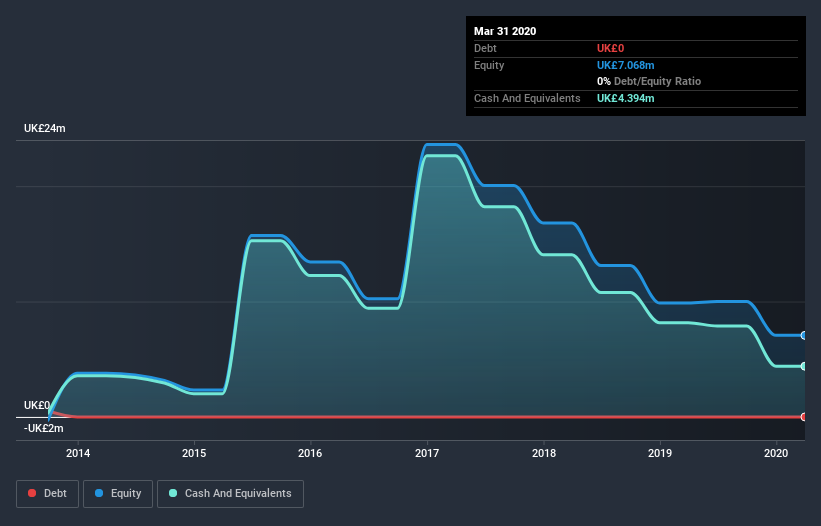Is Actual Experience (LON:ACT) In A Good Position To Invest In Growth?

Want to participate in a short research study? Help shape the future of investing tools and earn a $40 gift card!
Just because a business does not make any money, does not mean that the stock will go down. For example, although software-as-a-service business Salesforce.com lost money for years while it grew recurring revenue, if you held shares since 2005, you'd have done very well indeed. But while history lauds those rare successes, those that fail are often forgotten; who remembers Pets.com?
So should Actual Experience (LON:ACT) shareholders be worried about its cash burn? For the purpose of this article, we'll define cash burn as the amount of cash the company is spending each year to fund its growth (also called its negative free cash flow). Let's start with an examination of the business' cash, relative to its cash burn.
See our latest analysis for Actual Experience
How Long Is Actual Experience's Cash Runway?
A company's cash runway is calculated by dividing its cash hoard by its cash burn. When Actual Experience last reported its balance sheet in March 2020, it had zero debt and cash worth UK£4.4m. Importantly, its cash burn was UK£6.5m over the trailing twelve months. So it had a cash runway of approximately 8 months from March 2020. To be frank, this kind of short runway puts us on edge, as it indicates the company must reduce its cash burn significantly, or else raise cash imminently. You can see how its cash balance has changed over time in the image below.
How Well Is Actual Experience Growing?
At first glance it's a bit worrying to see that Actual Experience actually boosted its cash burn by 10%, year on year. At least the revenue was up 11% during the period, even if it wasn't up by much. In light of the data above, we're fairly sanguine about the business growth trajectory. In reality, this article only makes a short study of the company's growth data. You can take a look at how Actual Experience has developed its business over time by checking this visualization of its revenue and earnings history.
Can Actual Experience Raise More Cash Easily?
Since Actual Experience has been boosting its cash burn, the market will likely be considering how it can raise more cash if need be. Generally speaking, a listed business can raise new cash through issuing shares or taking on debt. One of the main advantages held by publicly listed companies is that they can sell shares to investors to raise cash and fund growth. By comparing a company's annual cash burn to its total market capitalisation, we can estimate roughly how many shares it would have to issue in order to run the company for another year (at the same burn rate).
Actual Experience's cash burn of UK£6.5m is about 16% of its UK£42m market capitalisation. Given that situation, it's fair to say the company wouldn't have much trouble raising more cash for growth, but shareholders would be somewhat diluted.
How Risky Is Actual Experience's Cash Burn Situation?
Even though its cash runway makes us a little nervous, we are compelled to mention that we thought Actual Experience's cash burn relative to its market cap was relatively promising. Looking at the factors mentioned in this short report, we do think that its cash burn is a bit risky, and it does make us slightly nervous about the stock. On another note, Actual Experience has 6 warning signs (and 2 which are potentially serious) we think you should know about.
Of course, you might find a fantastic investment by looking elsewhere. So take a peek at this free list of interesting companies, and this list of stocks growth stocks (according to analyst forecasts)
This article by Simply Wall St is general in nature. It does not constitute a recommendation to buy or sell any stock, and does not take account of your objectives, or your financial situation. We aim to bring you long-term focused analysis driven by fundamental data. Note that our analysis may not factor in the latest price-sensitive company announcements or qualitative material. Simply Wall St has no position in any stocks mentioned.
Have feedback on this article? Concerned about the content? Get in touch with us directly. Alternatively, email editorial-team@simplywallst.com.

 Yahoo Finance
Yahoo Finance 
